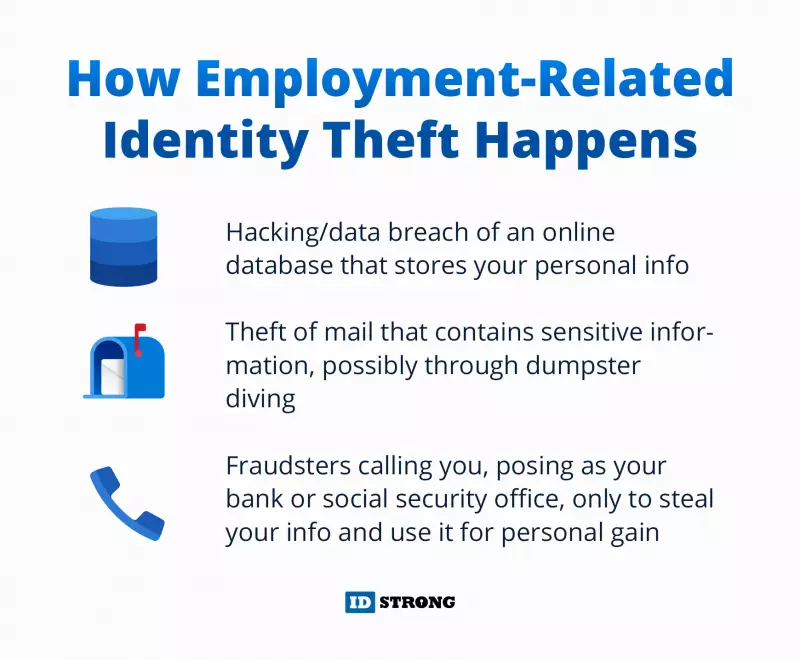What is Employment-Related Identity Theft and How to Prevent It
Table of Contents
- By Maria
- Published: Jun 03, 2022
- Last Updated: Jun 10, 2022

Identity theft is increasingly common in the United States and worldwide. The practice of obtaining identifying information, such as social security numbers, dates of birth, and addresses, happens every day. The information is then used by fraudsters for various unauthorized means, including posing as other individuals to gain employment and collecting wages under stolen social security numbers. This is referred to as employment-related identity theft, and it can cause a lot of serious issues for the victim. As with other identity theft, prevention is critical. Being knowledgeable about employment identity theft and how it can occur can help you prevent becoming a victim and prepare you to look out for others in your life.
What is Employment-Related Identity Theft?
Employment-Related Identity Theft is when your personal identifying information – name, date of birth, social security number, and address – is used to pose as you to get a job. If your social security number, name, and date of birth are used to get a job, the resulting earnings will be subject to taxes and, if left unpaid, can get you in trouble with the IRS and take years to resolve.
How does Employment-Related Identity Theft happen?
Employment-Related Identity Theft starts with the theft of your personal information. It can happen in a variety of ways:
- Hacking/data breach of an online database that stores your personal information
- Theft of mail that contains sensitive information, possibly through dumpster diving
- A phone call by a fraudster posing as your bank, social security office, or another agency usually has access to personal identifying information. They may call and try to get you to verify your information, only to steal it and use it for personal gain.

Once your personal information gets into the wrong hands, it could be used to apply for and secure a job. Once hired, your identity will be used for the employment and payroll record. The fraudster will work, get paid, and accrue a tax liability under your name.
How can Employment-Related Identity Theft Affect You?
An employment-related identity theft scam can target anyone. You could receive a notification from an employer you are not familiar with or the IRS that alerts you to your identity being used for employment. If you spot anything like this, it is always important to investigate it thoroughly. If you confirm that your identity has been used to get a job, it is vital to report it to the employer, the IRS, and local authorities, as it constitutes tax fraud. Ironically, leaving identity theft unaddressed can make it hard for you to get a job. Suppose your credit is affected by identity theft, and you do not address it. In that case, a potential employer could check your credit report as a pre-employment verification action and conclude that you are not financially responsible, moving on to a different candidate.
How to Prevent Employment-Related Identity Theft
As with all fraud and identity theft, prevention is vital. Preventing identity theft starts with safeguarding your personal information, including:
- Your address
- Your date of birth
- Your social security number
- Your official documents include your passport, social security cards, naturalization certificate, and driver’s license.
- In addition to keeping your documents safe, look out for documents belonging to minors in your care and elderly family members. They are often the most vulnerable identity theft targets.
Keep this information and documents secure by not sharing them with unauthorized or suspicious parties. Never provide social security numbers and other such information over the phone or via an unsecured email. If you need to dispose of anything containing this information, be sure to shred it before discarding it in the trash or recycling. Be suspicious of calls that ask you to provide personal information. If you are traveling or away from your home or office, make a plan for the secure pick-up of all your mail. Keeping identifying information secure is hands down the most important thing you can do to prevent employment-related identity theft.
To monitor whether your information has been used for employment-related identity theft, pay attention to any communications that reach you from the IRS or unknown organizations that have your personal information. Investigate these occurrences by going straight to the source. Do the same for your children’s and elderly relatives’ personal information. Consider subscribing to an identity theft monitoring service, as they can take the guesswork and manual steps out of the process for a low fee. These services provide broad-spectrum protection for all types of identity theft, including background check identity theft, which is also tied to employment-related identity theft.
It can seem like a daunting task to stay ahead of identity theft, but knowledge and access to the right tools go a long way. While certainly a challenge for all, strategies for prevention have proven to be quite effective, with a little going a long way.
















